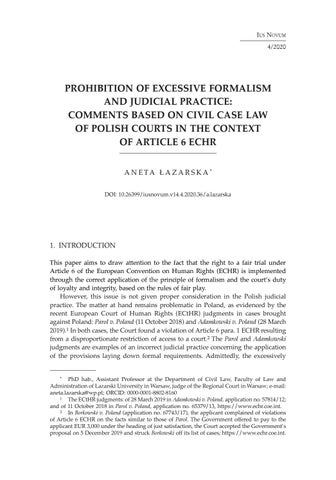Ius Novum 4/2020
PROHIBITION OF EXCESSIVE FORMALISM AND JUDICIAL PRACTICE: COMMENTS BASED ON CIVIL CASE LAW OF POLISH COURTS IN THE CONTEXT OF ARTICLE 6 ECHR A N E TA Ł A Z A R S K A * DOI: 10.26399/iusnovum.v14.4.2020.36/a.lazarska
1. INTRODUCTION This paper aims to draw attention to the fact that the right to a fair trial under Article 6 of the European Convention on Human Rights (ECHR) is implemented through the correct application of the principle of formalism and the court’s duty of loyalty and integrity, based on the rules of fair play. However, this issue is not given proper consideration in the Polish judicial practice. The matter at hand remains problematic in Poland, as evidenced by the recent European Court of Human Rights (ECtHR) judgments in cases brought against Poland: Parol v. Poland (11 October 2018) and Adamkowski v. Poland (28 March 2019).1 In both cases, the Court found a violation of Article 6 para. 1 ECHR resulting from a disproportionate restriction of access to a court.2 The Parol and Adamkowski judgments are examples of an incorrect judicial practice concerning the application of the provisions laying down formal requirements. Admittedly, the excessively * PhD hab., Assistant Professor at the Department of Civil Law, Faculty of Law and Administration of Lazarski University in Warsaw, judge of the Regional Court in Warsaw; e-mail: aneta.lazarska@wp.pl; ORCID: 0000-0001-8802-8160 1 The ECtHR judgments: of 28 March 2019 in Adamkowski v. Poland, application no. 57814/12; and of 11 October 2018 in Parol v. Poland, application no. 65379/13, https://www.echr.coe.int. 2 In Borkowski v. Poland (application no. 67743/17), the applicant complained of violations of Article 6 ECHR on the facts similar to those of Parol. The Government offered to pay to the applicant EUR 3,000 under the heading of just satisfaction, the Court accepted the Government’s proposal on 5 December 2019 and struck Borkowski off its list of cases; https://www.echr.coe.int.

